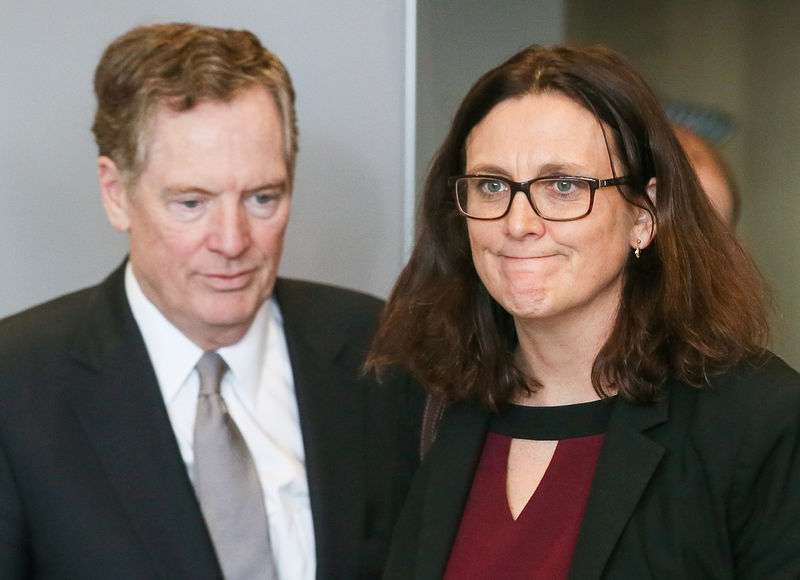By Philip Blenkinsop
BRUSSELS (Reuters) - European Union leaders gave a cautious welcome on Thursday to news that U.S. President Donald Trump had decided not to apply tariffs to European steel and aluminium but said they were waiting for Washington to confirm that decision.
U.S. Trade Representative Robert Lighthizer had earlier told a Senate committee hearing that Trump had chosen to "pause" the imposition of metals tariffs for Argentina, Australia, Brazil, Canada, Mexico South Korea and "Europe".
His comments prompted EU leaders arriving in Brussels for a summit to postpone a discussion about transatlantic trade tensions until later in the evening.
The United States is set to begin charging import duties of 25 percent on steel and 10 percent on aluminium from Friday.
One senior EU official described Lighthizer's announcement as "welcome, in line with our expectations", adding: "But we'll see whether this is officially confirmed."
The exemption from tariffs, if it is confirmed, followed EU Trade Commissioner Cecilia Malmstrom's trip to Washington for talks with Lighthizer and U.S. Commerce Secretary Wilbur Ross.
Briefing EU ambassadors and the European Parliament on Thursday morning, she had indicated there was a greater willingness to find a solution to avert a trade war.
German Chancellor Angela Merkel told reporters that Europe had shown itself united in its support of free trade and rejection of protectionism.
French President Emmanuel Macron said he expected a final announcement on U.S. tariffs late evening Brussels time.
"My wish is that we can continue to preserve international trade rules that are good for all and that the powers that have contributed to putting them in place will assure that they are respected," he said.
TECH TAX
The European Commission has proposed that, if tariffs are imposed, the bloc should challenge them at the World Trade Organization, consider measures to prevent metal flooding into Europe and impose import duties on U.S. products to "rebalance" EU-U.S. trade.
The EU leaders' second topic on Thursday, taxation, also threatens to expose transatlantic strains.
The European Commission on Wednesday proposed rules to make digital companies pay more tax, with U.S. tech giants such as Google (NASDAQ:GOOGL), Facebook (NASDAQ:FB) and Amazon (NASDAQ:AMZN) set to foot a large chunk of a potential 5 billion euro (£4.3 billion) bill.
EU Economics Commissioner Pierre Moscovici brushed off accusations that he was going after rich American tech companies to enrich EU coffers and France, Germany, Italy, Britain and Spain welcomed the proposals in a joint statement.

However, some smaller countries fear the proposed tax would undermine their ability to attract multinationals and see the measure as more likely to shift tax revenue to bigger EU countries rather than raising more money.